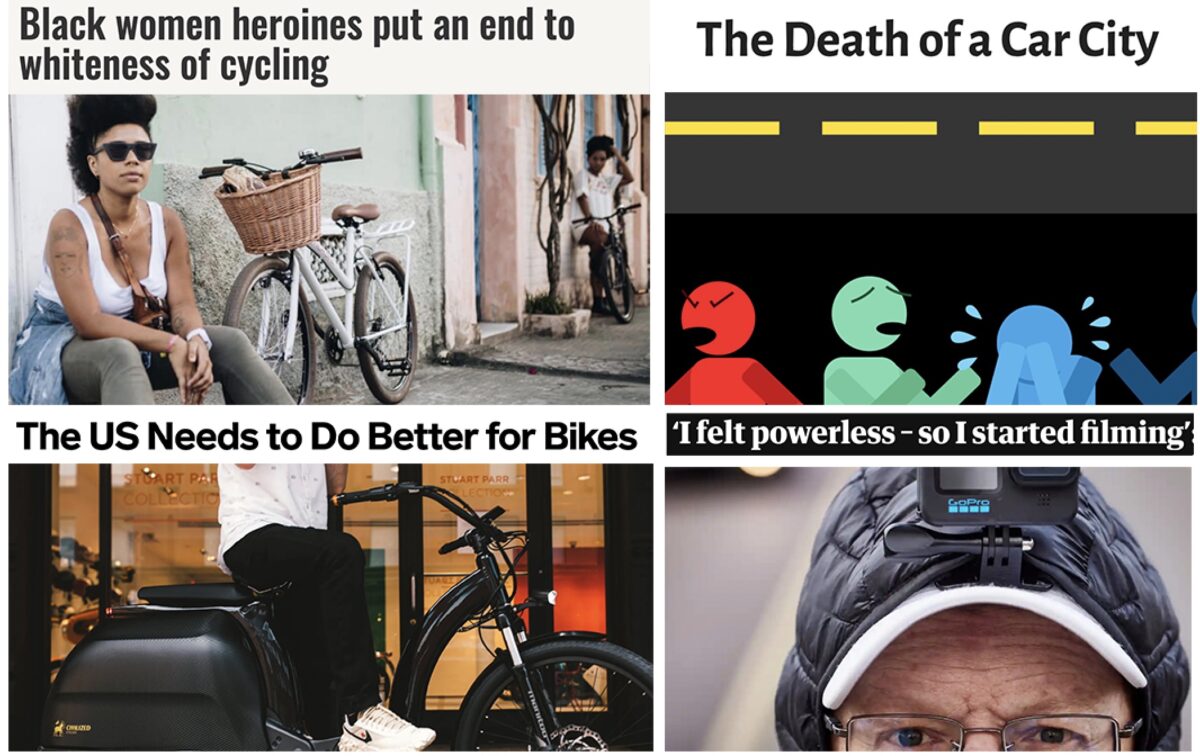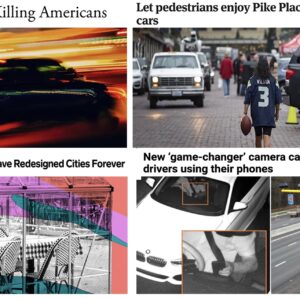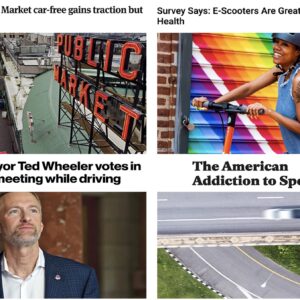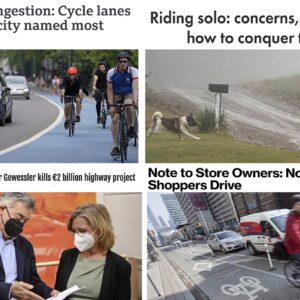Happy Monday everyone.
This week’s Roundup is brought to you by Nossa Familia Coffee, who reminds you that a portion of the sale of every pound of their Full Cycle roast goes right back into our community.
Here are the most noteworthy items our writers and readers came across in the past seven days…
Just accept it: I think Portland could learn from this clever, five-stages-of-grief framing of the imminent shift away from car-centered cities.
Resiliency: The colossal breakdown of major driving corridors due to last week’s severe winter storms is Exhibit A on how fragile a transportation system is when it’s based almost entirely on moving single-occupancy vehicles.
Confronting cycling’s whiteness: Learn about the transformative work of Brazil’s Lívia Suarez, whose Casa de Frida has become not just a welcome space for Black and brown bike riders, but the hub of an influential movement that’s helping make biking better in her hometown.
Metro on climate: Don’t miss this breakdown of what City Observatory’s Joe Cortright calls Metro’s “failing” climate strategy, which claims the agency need to act much differently if they plan to cut emissions in a significant way.
Filmed by bike activism: The Guardian has a closer look at a British man who has used a helmet-mounted camera to report over 1,000 drivers to the police for a variety of infractions.
Advertisement
Metro council candidate: Ashton Simpson earned coverage in the Willamette Week where he shared his frustrations over what he sees as inequitable investment in east Portland that continues to lead to too many deaths and injuries.
The Great EV Imbalance: A Portland-based writer points out in this Wired article that the current financial incentives for e-bikes aren’t nearly robust enough — and shares some delicious quotes about why our heavy focus on EV-cars is very flawed.
$216 million for bike plan: The Italian city of Milan hired a Dutch consulting team to create a bike plan that will spend big to reach 20% cycling mode share by 2035.
Fake it till you make it: The Washington Post extols the virtues of a “fake” bike commute to help with your mental and physical health in our working-from-home era.
Influence of social media: An event that asked would-be participants about their social media reach spurred veteran racer Geoff Kabush to question the cycling industry’s allegiance to influencers.
Tesla tunnel snafu: A must-read breakdown of how Elon Musk’s tunnel loop in Las Vegas broke down with bumper-to-bumper traffic.
Thanks to everyone who sent us links!








Thanks for reading.
BikePortland has served this community with independent community journalism since 2005. We rely on subscriptions from readers like you to survive. Your financial support is vital in keeping this valuable resource alive and well.
Please subscribe today to strengthen and expand our work.
What solution does this incident point to? Buses and would be equally stuck, and Amtrak has 14 hour delays even without snow. I suppose on the bus, at least, you can eat your fellow passengers if things get dire.
Is this an argument for more convenient local and regional air travel? Hyperloop? A network of snow-proof Boring Company tunnels? SpaceX point-to-point rocketry?
Like many transportation problems we face Watts, the answer is smarter land-use. Proximity is the key to a resilient system. Highways are a symptom of the disease of sprawl and cars are what enabled these long distances.
But if we did focus on mode.. I have a hunch that a high-quality train system would be much more resilient (let’s not use Amtrak as a comparison).
I-95 is a long-distance highway, and all the photos and stories in the article suggest those stranded were travelling between cities. More compact urban areas can reduce local traffic, but do not reduce the need for interurban travel.
I’d love it if we had a high-quality regional rail system, but European passenger trains too are impacted by heavy snow, so a freak weather event in Virginia may not be the strongest argument.
If you actually wanted to see higher density in Portland you would not identity as a YIMBY. After all, Portland YIMBY orgs (and YIMBY lobbying firms) have had a laser focus on promoting policy that deregulates single household “owned” homes and disincentivizes multi-family rental housing.
For example:

PS: I oppose all urban zoning that allows a FAR less than 3. We need real multifamily density, not YIMBY low-density condos and “small” single family homes.
Soren. You are so caught up on seeing every person as just a collection of labels? Have you and I ever talked about housing? Why do you assume to know my beliefs about it?
I apologize for calling you a YIMBY and am glad that you are disavowing this Reaganite trickle-down economics ideology.
However, you might want to update your twitter handle description:

oh that’s funny. I didn’t even know I had that in my profile. I think you are still missing my point tho. I’m not disavowing anything and I am not rigidly adhering to anything. I have nuanced thoughts on these very complicated topics and I just don’t see why you and so many other folks discuss things in these black/white terms think that everything has to be a hot take or has to align perfectly with some belief system.
I want our cities to have more housing units in them. I abhor NIMBYs and I like the idea of saying “yes” to more people living closer to me in more types of dwellings. I am not a housing policy expert, so I can’t get into details like FAR and other policy details. In general, I believe in making more types of housing legal and more plentiful! If you have a specific situation you want to ask me about, I can tell you how I feel about it because I like to look at context and specifics and take things as they come.
IMO, anyone who supports deregulating and subsidizing detached home ownership (e.g. Sightline and P:NW — organizers of the upcoming YIMBYtown conference) is staunch supporter of “financialized” low-density housing.

I think Americans (and many non-Americans) have a strong preference for detached housing when they’re in the “settling down” phase of life. Most folks (with plenty of exceptions) don’t want to buy high-density housing.
Renters, at least those that can afford new dense housing, know their circumstances are temporary and are more willing to make the tradeoffs required by high-density apartment living. Most of the new apartments we’re building in the inner city are only affordable by the the same urbanist YIMBY class that has largely pushed for this style of development.
USAnians prefer single unit detached houses because there is a gravy train of government subsidies, deductions, and credits that have made house ownership the primary source of wealth inequality in the USA. This is why it’s hypocritical for YIMBYs to advocate for lot-splitting which further enriches the ownership class (and increases the price of lots that could accommodate multifamily housing).
The “market” has no interest in building enough housing to increase affordability (decrease profits). The market itself is the primary barrier to affordable housing.
These are the same subsidies which are offered to attached houses. That doesn’t explain our (strong) preference.
Ownership offers a lot of “non-subsidy” benefits as well, including control, stability, and the financial benefits of building your own equity vs. someone else’s.
There are no subsidies for residents of the vast majority of market-rate “attached” houses (e.g. renters in multifamily houses). In the USA only the well off get subsidies and the poor have to pay for them.
JM, you need to explore VA far more, particularly outside of the Northern VA/DC area. The state has some of the best planning practices and land use laws in the country, almost as good as Maryland.
Virginia doesn’t typically get a lot of wet snow all of the sudden – it’s not the Midwest – and when it does get snowed in, car and train traffic inevitably gets snarled. In western Oregon and Washington this also happens, but we already know that both states have no sprawl and the best land use policies with outstanding inter-city rail, so such things cannot happen there, right?
The Carolinas were rained on in that same storm, but got little snow and almost no congestion. West Virginia and Pennsylvania were equally snowed in, but they are much more used to it, with drivers who know better how to cope (or not leave home in the first place).
I95 made all the news but I think there were major issues for all forms of transportation. My understanding is that parts of Amtrak shut down. You would have to check local news sources to see how local transit did. If it happened in Portland both light rail and busses would have issues.
https://wset.com/news/local/virginia-senators-press-amtrak-for-answers-on-passengers-stranded-in-winter-storm
I now do a “fake” bike commute most days since I used to bike to work everyday previously. What’s nice is that in the colder months I can move my “commute” to lunchtime for a more pleasant ride! I still mostly bike the same route I used for work because it is close to my house and I can easily vary it based on how much time I have to spend riding.
I like the idea of using a GoPro to record bad drivers, but I hope he’s not wearing a helmet just for the interview.
The Vegas Loop article reminded me of a 40 minute video (now two years old) which breaks down why the Boring Company and Hyper Loop are ridiculous. Thanks to that video, none of the article’s details surprised me. Here it is: https://www.youtube.com/watch?v=4dn6ZVpJLxs
Thanks for the post. RE Filmed by bike activism- what’s the deal in PDX/Oregon? Will police respond with citizen video?
Mikey and his camera show the potential for a different kind of traffic policing with much less chance of escalation leading to deaths. Just put the cops on bicycles and have them ride around recording everybody and then fining the ones breaking the law and sending the recordings to the courts of the crimes committed. How many serious road crimes does the average plod catch per year? Not as many as Mikey and his GoPro.
That or use fixed roadside cameras. But it only works if the cars have identifiable license plates, which is not a given, and if you can prove that the vehicle is being operated by the registered owner (which is an extremely difficult hurdle that has been thrown in the way of reasonable and equitable enforcement in the state of Oregon by ostensibly well meaning judges).
This needs to change. Make the owner of the car responsible for who they let use their car.
Speeding tickets and their ilk seem fundamentally different than a parking ticket because they show up on your driving record, with the potential to lead to suspension of your license to drive, whereas parking tickets essentially disappear after they’ve been paid.
If you want to cite someone for running a red light, you need cite the person who ran the red light, not their spouse or parent or friend.
We have mechanisms for compelling testimony; let’s use those if we need the owner to attest to whom they lent their car.
When some of the worst driving offenders in my neighborhood have no license plates it’d be difficult to find the owner and with the police not enforcing traffic laws anymore it’ll remain that way.
I love Mikey’s persistence but in the US we are not quite as civilized and I have no doubt that he would be shot by one of our road ragers.
Not to mention that most places here are not set up with laws/tools to use submitted video evidence. I ride with a camera and only submit the worst/most dangerous incidents and at best I’ve had the police contact the driver to issue a warning (which is not nothing, and I hope acts as somewhat of a deterrent).
I had a chance to take a 1 on 1 ride with Ashton this summer to view sidewalk projects that won’t be built in in outer NE. I saw the passion needed for east Portland representation on Metro. He tells it like it is. I’m in.
This is a journalistic nitpick:
It looks like Lívia Suarez’s work in Brazil is awesome! But I really don’t like the headline of that article:
“Black women heroines put an end to whiteness of cycling.”
The secondary headline explicitly relates this to cycling in the USA: “Mobility justice movements in the US take notice.”
I find framings like this so dismissive (or merely ignorant?) of the vast number of Black people who ride bikes, and have done so for over a century. It’s also odd that the author or publisher chose a headline that both overstates the impact of Suarez’s efforts (like, if she’s ended white supremacy in “cycling,” that’d would be bigger news; the reality is that her work is important because it is chipping away at still-extant racist structures) and understates the long history of Black people on bikes.
Anyway, it’s cool work she’s doing. I just don’t think the headline does justice to her work, or the Black activists and riders who preceded her.
Metro on Climate: Metro enters the lair of Smaug wearing a cloak of invisibility from the Dollar Store®.
Tesla/musk once again proves he is the quintessential snake oil sale person of the year.
In regards to cycling dude with a camera, he proves himself to be a male Karen with an axe to grind. So
What someone is looking at their phone at a light. It’s if their moving with a phone. That’s where the real numbers of carnage is. Would you want points for a rider who looks at their phone mounted on their bars at a light? Sure we can go full babysitter on someone or address the real
Issue -phone use while moving. Another article that divides. Lame.